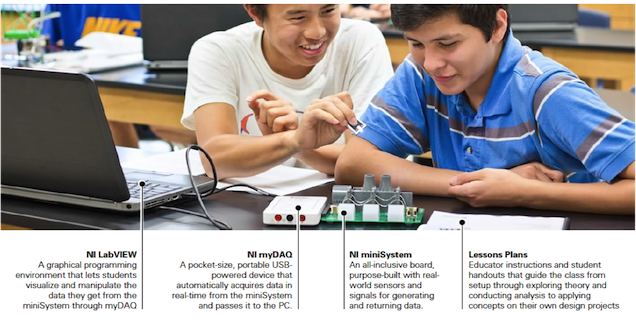Brooke Turner,
Project Manager, Academic Courseware
National Instruments
In the quest for engineering education not much has changed in terms of process. From grade school to grad school, most school years end with a flurry of projects and presentations. This rush at the end of the semester is to prove that the material students spent months mastering does, in fact, have relevance in the “real world.” After the repetition of reading about concepts, answering questions, and watching the instructor demonstrate an example, students try to apply what they supposedly absorbed from countless hours of passive learning. Needless to say, keeping students engaged through months of traditional, text-based instruction is difficult at best.
While many educators crave (and actually dream about) the day they can implement an all hands-on, project-based learning curriculum, that often takes more time and resources than they can possibly fit into a typical class, especially one where experimentation may not be the primary focus.
But, not all is lost. It is possible to take a step in the right direction. Start students on small, but engaging hands-on experiences that allow them to explore and learn without requiring a lot of background knowledge. Educators should guide them to build those connections as they almost unknowingly dive deep into important concepts like heat transfer or wave mechanics. Through the interactive nature of these experiences, concepts that seem boring or inconsequential on paper become the most interesting lesson of the week. As they are given more time with experiments, students discover questions to research and decide for themselves what experiments to conduct.
National Instruments understands that incorporating technology and experimentation into courses can be a challenge for many schools. So they’ve developed a tangible solution to address these needs.

The NI Action Packs are a comprehensive bundle of tools created specifically for educators. They use the NI LabVIEW graphical programming language, NI myDAQ measurement device, and NI miniSystems, to help students explore the physical world around them on their own terms. Schools and colleges around the world are using these powerful, but accessible tools to ensure that students experience the power of instant relevance that comes with having an industry-inspired hands-on experience as part of the introduction to complicated concepts like structural analysis, power grid technology, or thermodynamics. For them, real-world connections and engagement begin in week one and continue to progress throughout the semester versus waiting until the end of the semester project.

As Farner and Garber have found, the ideas and tools in the NI Action Packs do not end with the introductory activity; the same hardware resources can be reused with LabVIEW, to give students a tool they can use to make the end of course projects even better. Better yet, students can explore and discover on their own terms year-round.
Beyond the classroom, the engineering industry demands that students graduate with the skills and experience to solve a broad range of engineering challenges in an increasingly complex world. Knowing how components work is not enough; today’s students need the skills to understand and design full system solutions. Only spending time in the classroom will not provide these skills, so educators, parents, and students must find ways to foster development through personally driven hands-on projects and out-of-classroom experiences. Students who are able to discover their own questions and design their own solutions will continue to do so outside of the classroom intrinsically.
For more information on NI myDAQ and all accessories, visit www.ni.com/mydaq.


Leave a Reply
You must be logged in to post a comment.